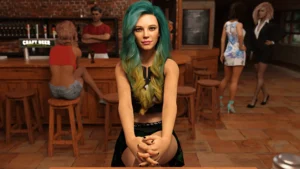
One Day at a Time
Play One Day at a Time
One Day at a Time review
Analyzing Complex Themes in Contemporary Storytelling
Modern sitcoms increasingly tackle complex social issues through character-driven narratives. This analysis examines how one groundbreaking series approaches sensitive topics through its multi-generational family lens, balancing humor with thoughtful commentary on contemporary challenges.
Intergenerational Communication Strategies
Navigating Difficult Conversations
Let’s face it—talking to your abuela about mental health or explaining TikTok trends to your mom isn’t exactly a walk in the park. 😅 One Day at a Time nails this messy reality by showing how the Alvarez family tackles family communication patterns that feel way too relatable. Take Season 1’s therapy episode: Penelope hesitates to tell Lydia she’s seeing a therapist because “en esta familia, we don’t air our dirty calzoncillos” (translation: we don’t air our dirty laundry). But when Lydia accidentally discovers the truth, the show delivers a masterclass in intergenerational understanding—complete with tears, Cuban coffee, and a grudging acceptance that maybe talking about feelings isn’t so terrible.
The secret sauce? The writers use cultural identity exploration to frame these clashes. For example, when Penelope tries to discuss her PTSD with her kids, she defaults to humor to soften the blow—a coping mechanism rooted in her Cuban-American upbringing. Meanwhile, Lydia’s reluctance to acknowledge mental health struggles mirrors generational stigma common in immigrant families. The show doesn’t just show these conflicts—it gives us a roadmap for navigating them:
– Acknowledge the discomfort (Yes, abuela, this is awkward)
– Find common ground (We both want what’s best for Alex)
– Use humor as a bridge (Lydia’s dramatic “Dios mío!” moments soften tension)
💡 Pro tip: Notice how Dr. Berkowitz (the therapist) encourages “I” statements? Try that next time your tía asks why you’re still single.
Cultural Expectations vs Modern Realities
Picture this: Lydia insists on throwing Elena a quinceañera, while Elena—a feminist teen—wants to boycott the tradition. 🎉 vs ✊ This Season 2 showdown isn’t just about party planning—it’s a crash course in cultural identity exploration. The Alvarezes’ multigenerational household becomes a battleground where tradition collides with progressive values, forcing everyone to ask: How do we honor our roots while embracing who we’re becoming?
The show cleverly uses multigenerational household dynamics to highlight generational divides. Lydia’s strict adherence to Cuban customs (“En Cuba, we respected our elders!”) clashes with Penelope’s modern parenting style, which balances respect with open dialogue. But here’s the kicker: By Episode’s end, they compromise—Elena gets a “quinceañera protest” that blends activism with family tradition. It’s a win-win that teaches us:
– Traditions can evolve without losing meaning
– Listen first, judge later (even if abuela’s side-eye is strong)
– Modern parenting challenges require flexibility (and maybe a lot of cafecito)
| Generation | Communication Style | Conflict Resolution |
|---|---|---|
| Lydia (Grandparent) | Direct, emotionally charged, uses cultural proverbs | Seeks family consensus, prioritizes harmony |
| Penelope (Parent) | Blunt honesty mixed with humor, therapy-influenced | Open dialogue, encourages emotional vulnerability |
| Elena/Alex (Teens) | Digital-native, values transparency & social justice | Prefers logical debates, seeks compromise |
🌱 The takeaway? Every generation brings something vital to the table—even if the table’s wobbling under all that generational baggage.
Support Systems in Family Structures
Here’s the truth bomb: No one nails intergenerational understanding on the first try. But One Day at a Time shows how the Alvarezes’ family communication patterns turn their living room into a safety net. Remember when Alex came out? Lydia initially fumbles (“But you love girls!”), Penelope panics about doing/saying the wrong thing, and Elena—ever the activist—hands out LGBTQ+ pamphlets. 😂 Yet by the episode’s end, their multigenerational household dynamics shine: Lydia bakes Alex’s favorite pastelitos “because love is love,” Penelope admits her fears, and Elena organizes a mini Pride parade in their apartment.
The lesson? Support systems thrive on imperfect effort. The show mirrors real-life modern parenting challenges—like when Penelope struggles to afford Elena’s college tuition. Instead of hiding it, she calls a family meeting, proving that vulnerability isn’t weakness. Their strategy?
– Normalize asking for help (Even supermoms need backup)
– Celebrate small victories (Lydia’s “We survived another day!” toast)
– Leverage cultural strengths (Their Cuban roots teach resilience through humor)
🚀 Final thought: The Alvarezes aren’t perfect—they’re better. They show us that family communication patterns built on love, patience, and the occasional chancla threat can turn any crisis into a bonding moment. So next time your family’s arguing over empanadas vs avocado toast, remember: It’s not about agreeing—it’s about showing up. 💖
This examination reveals how thoughtful storytelling can address complex social issues while maintaining entertainment value. The series demonstrates the power of media to foster understanding through relatable character journeys and culturally grounded narratives. Future productions could benefit from adopting similar approaches to meaningful content creation.






























